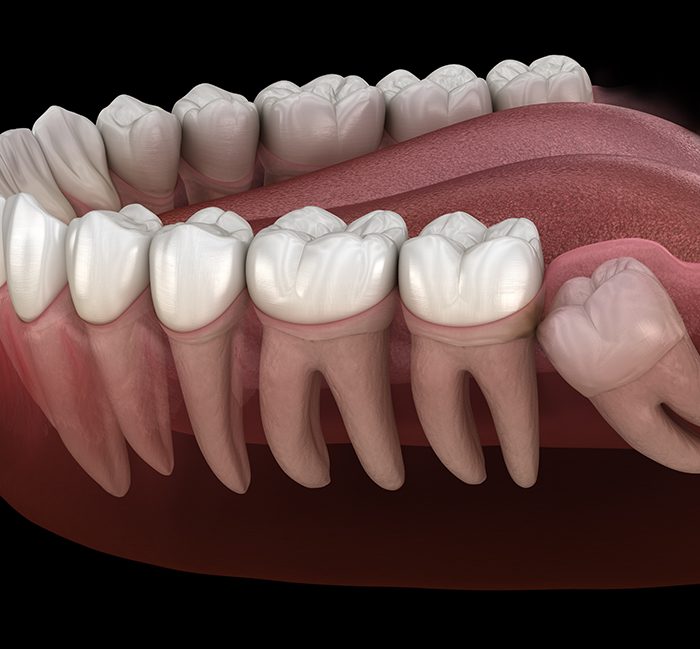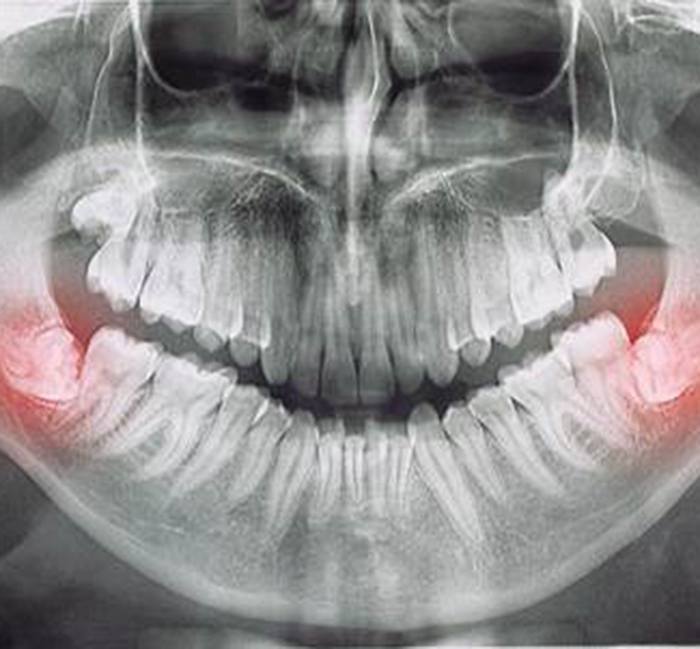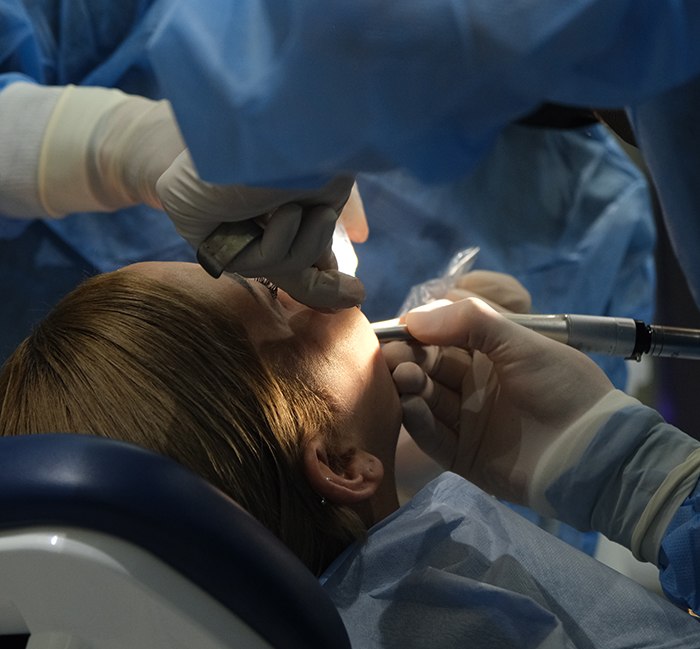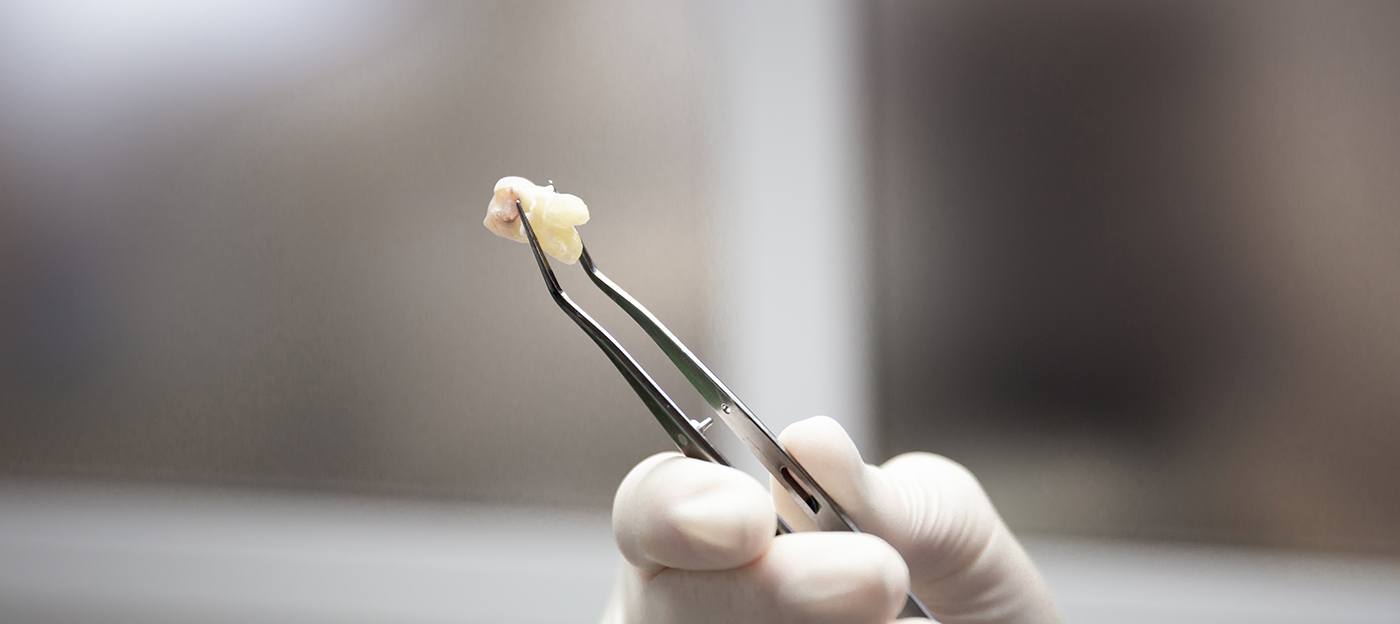Wisdom Tooth Extraction – Red Oak
Say Goodbye to Your 3rd Molars!
Wisdom teeth may have been helpful tools for our early human ancestors’ survival, but today, they seem to mostly just cause trouble. This is because most people don’t have enough room in their mouths to accommodate them. To prevent the possibility of impaction and other complications, it is beneficial for many patients to have their wisdom teeth taken out. We perform this procedure right here in our practice, so you don’t need to work with another doctor at a separate location. To learn more about wisdom tooth extraction, give us a call to schedule your consultation.
What Are Wisdom Teeth?

The wisdom teeth are the third molars and the final adult teeth to erupt in the mouth. Most people develop four wisdom teeth – two on top and two on the bottom. Anthropologists believe that the wisdom teeth were helpful for our early ancestors who needed additional chewing power to consume rough plants, seeks, nuts, and foliage that made up their diets. It was also common to lose teeth for one of many reasons, so the wisdom teeth could step up and act as replacement teeth in these situations.
Today, we enjoy a softer diet with more carbohydrates and high-calorie foods. We also have a deeper focus on dental care, so the wisdom teeth aren’t usually necessary. The need for extraction varies on a case-by-case basis.
Why Do Wisdom Teeth Need to Be Removed?

Wisdom teeth often need to be extracted because they pose oral health threats. Various problems can occur if wisdom teeth don’t have enough room to develop properly. This includes overcrowding, oral hygiene issues, discomfort, impaction, risk of cysts, and more! Here are some signs that could indicate that you need to have your wisdom teeth extracted:
- Pain while eating
- Jaw stiffness
- Facial swelling
- Bad breath
- Difficulty opening the mouth
- Repetitive infections
What to Expect from the Wisdom Teeth Procedure

If your wisdom teeth have already erupted, we use dental forceps and an elevator to extract them. If they haven’t erupted, an incision needs to be made into the gums to expose the tooth and bone. Any bone that blocks access to the tooth will need to be removed. In some cases, a tooth may need to be removed in pieces. Afterward, the site of the extraction is cleared of any debris and stitches may be used to close the wound if needed. Gauze is placed over the extraction site to control bleeding and help a blood clot form.
Recovering from Wisdom Teeth Extraction

Following your procedure, it is common to experience bleeding swelling, bruising, and discomfort, but this should subside over the next few days. During this time, it is especially crucial to maintain an excellent oral hygiene routine. This includes rinsing and brushing gently while avoiding the extraction site. You should also stick to a soft-food diet and refrain from smoking or using straws. Remember to take prescribed and over-the-counter medications as directed by your dentist. For questions or concerns regarding your recovery, give us a call!
Wisdom Tooth Extractions FAQs
Why Do We Have Wisdom Teeth?
It’s natural to wonder why we have wisdom teeth when they consistently seem to cause more trouble than they’re worth. However, it’s believed that our ancestors developed them in the distant past out of necessity.
It’s widely believed that humans lived on a rough diet of raw meat, berries, nuts, roots, and leaves and didn’t cook their food. This was tough on their teeth, so they may have needed these extra molars to compensate for any they might have injured or lost as children. Today, they’re considered a vestigial feature because they are no longer required for our survival.
Does Everyone Have Wisdom Teeth?
Most individuals have four wisdom teeth in total; one for each quadrant of the mouth. However, not everyone develops these last molars, and some others are born with only one, two, or three wisdom teeth.
In fact, one study published in 2015 shared that an estimated 5% to 37% of people are missing one or more of these chompers. No one knows exactly why this happens, but genetics is believed to play a major role. If your parents didn’t grow all their wisdom teeth, you’re likelier to do the same. Our team in Oak Point can provide X-rays or other imaging to see below the surface of your gums to let you know how many you have.
What’s the Best Age to Have Wisdom Teeth Removed?
Although there’s no age restriction on getting your wisdom teeth extracted, most dentists recommend undergoing the procedure in early adulthood. This is because your jaw continues to firm as you age, meaning your wisdom teeth become more firmly embedded. This makes it harder to remove them when the time comes and can also prolong your recovery.
Plus, scheduling the procedure during high school or college is often easier because long vacations, like the winter holidays or spring break, are built into the year. These weeks give patients ample time to undergo treatment and recover before classes resume. Finding enough free time to heal effectively can be harder once you’re a working adult with a full-time job.
When Can I Eat After Wisdom Tooth Extraction?
The length of time you must wait before you can eat normally depends significantly on your unique situation. Different factors like your age, medical history, immunity, and how many teeth were treated can all impact how long it takes to recover.
Our team will provide post-op instructions for you to follow after your procedure that are intended to help you heal effectively while avoiding potential complications, like dry socket. This includes waiting an hour or two after your procedure to eat, because you’ll likely still feel numb and might bite or burn yourself accidentally.
Then, it’s best to stick to a liquid diet for the first day, but avoid drinking through straws because the force of suction can dislodge the blood clot that forms over the extraction site. Over the next few days, you can graduate to soft foods like mashed potatoes, scrambled eggs, yogurt, and pudding. Usually, you can resume eating solid foods about a week after your extraction.

